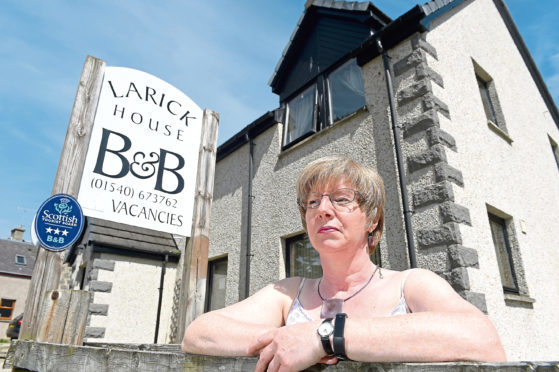Research by the Federation of Small Business (FSB) has revealed that 73% of Highland businesses oppose the introduction of a potential £10 million-a year tourist tax in the region.
And three-quarters of the 253 businesses surveyed across the north also said the introduction of the levy – possibly at £1-a-night per bed – would have a damaging impact on other local businesses and economies.
Business owners say that a tourist tax on top of already high 20% VAT rates on hotel accommodation would push visitors elsewhere, while council leaders say it is a logical option to raise revenue for services and infrastructure to cope with rising visitor numbers.
But Amanda Frazer, FSB’s Highlands and Islands leader, said the strength of opposition should come as a “wake-up call” to Highland Council and the Scottish Government, and that taxing visitors to “shore up budgets” will threaten the existence of communities which depend on them.
She said: “Passions are running high, and rightly so, because a new Highland tourism tax is bad for business, bad for local Highland economies, and bad for communities.
“Tourism happens to be on the up at the moment, but tourists are notoriously fickle and easy come, easy go. If they feel that they are receiving poor value for money thanks to all the tax they have to pay, social media and word-of-mouth will ensure that this damaging message spreads like wildfire.”
Local authorities currently do not have the power to introduce a tourist tax – and establishing such a power would require an act of the Scottish Parliament.
However in Edinburgh, which the FSB survey revealed has similar levels of opposition, the council is pressing ahead with a “business case” for its introduction. Visitor numbers during the busier months of August and December are a particular problem in the capital.
The FSB argue that a tourist tax works in other European countries where there are reduced VAT rates on hotel accommodation.
Ms Frazer said that, post Brexit, it is vital that the north’s key sectors can compete on the world stage on quality, price and value for money, especially if they want to tap into the growing Chinese market.
She said the local authority should instead be calling for more money from the Scottish Government for improving transport, digital infrastructure and housing, and to help retain young people in rural areas.
Highlands and Islands MSP Edward Mountain (Scottish Conservatives) said: “Placing a ‘tourism tax’ on accommodation in the Highlands would only be detrimental and would probably make visitors reconsider their destination.”
Last night, Highland Council leader Margaret Davidson said she would welcome discussions with business groups about some “strong targeted lobbying” to seek reductions in VAT and rates.
In December, a report produced by the local authority’s director of development and infrastructure, Stuart Black, said a £1-a-night levy on tourists staying at hotels across the north would raise £10 million a year for infrastructure.
The report stated that visitor numbers to the Highlands soared by 18% to 6.1 million between 2012 and 2016, with the economic impact rising by 34% to £1.2 billion.
The council’s vice convener Allan Henderson, co-chairman of a new Tourism Working Group, said he can understand the FSB’s position and admitted he at one point was opposed to the tourist tax concept. But he added: “A levy such as this allied to the Rural Tourism Infrastructure Fund (£6 million government fund) could transform how we treat our visitors who generally appreciate the green credentials of the Highlands.”
He says that with “clear articulation” to tourists that they would be contributing to the infrastructure of the Highlands, as opposed to clogging up roads and glens, it would ensure they left the Highlands with a “renewed sense of pride”.
FSB conducted its survey with businesseses with the support of Visit Loch Ness, SkyeConnect, Visit Wester Ross, Venture North and Discover Glencoe.
Types of businesses surveyed ranged from those in hospitality to financial services and manufacturing, retail and agriculture, forestry and fishing.
A Scottish Government spokesman said there are no plans to introduce a visitor levy on the tourism sector, stressing that it is already subject to the second highest VAT rates in Europe under the UK Government
The spokesman added that they continue to “deliver a fair deal” to councils, with revenue and capital funding increasing in real terms in the next financial year.
